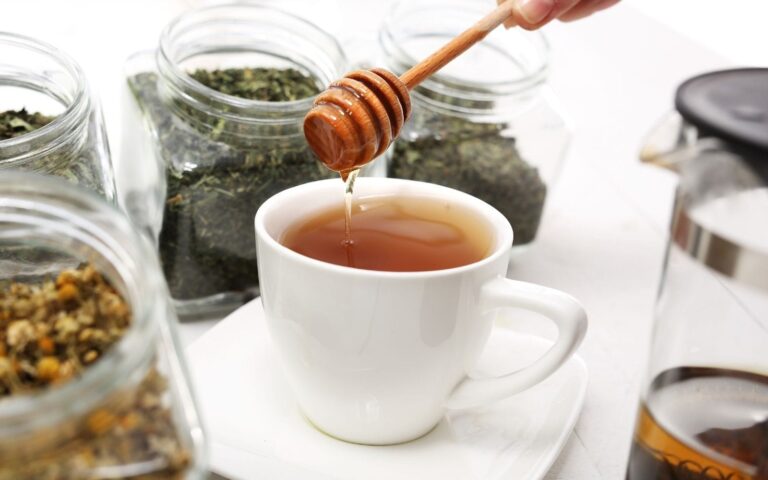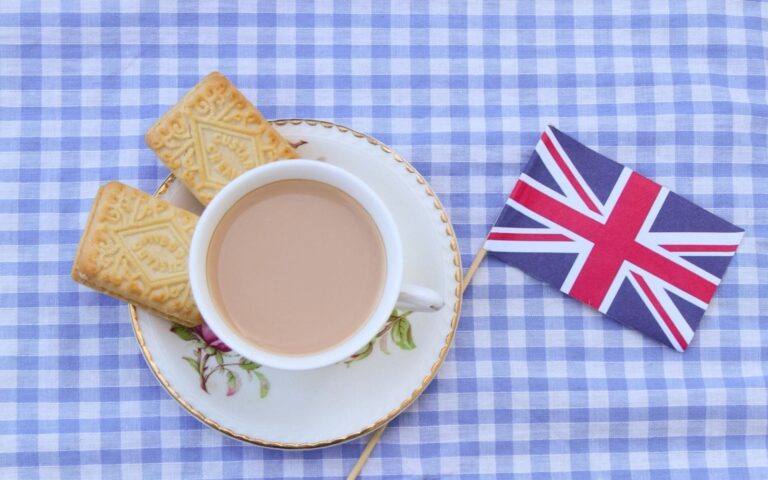Does Tea Make You Hungry: Ultimate Guide

Disclosure: This post may contain affiliate links. If you click on a link we may make a small commission at no extra cost to you. You can read the full disclosure here
Does Tea Make You Hungry
This is a good question that seems to produce a mixed response. Does tea make you hungry? has been discussed on many forums. For example, the Reddit Community has conflicting views with some finding it an effective appetite suppressor, often managing to go a whole day with tea alone and not feeling hungry.
While others find it works the other way round, eating more than if they hadn’t been drinking tea.
Does drinking tea increase weight?
Tea may actually help you to lose a small amount of weight when you pair it with a sensible diet and exercise regime. It is believed that the caffeine in tea may have a thermogenic effect on the body to help burn fat. However, some people may choose to add sugar, honey, or other sweeteners to their tea in order to make it more palatable to drink. These additions can cause the calories in tea to increase, thereby contributing to weight gain.
So whether you’ve noticed that the minute you take a sip of tea hunger rushes through your body or conversely it helps you to successfully fight off those midday munchies, let’s take a look at the contradicting viewpoints and context surrounding them regarding the question does tea make you hungry?
What Is In Your Cup Of Tea

Tea is one of the most popular drinks worldwide. Commonly served hot or iced anywhere, anytime, and for any occasion, it has been brewed and enjoyed for thousands of years. Many research investigations in more recent times have focused on its value to human health. They have discovered its benefits go far beyond refreshment.
It is a source of caffeine, polyphenols, amino acids, vitamins, and minerals. The majority of these compounds have strong antioxidant activity, reducing oxidative stress and regulating inflammatory processes – all helping to lessen the risk of chronic disease.
So it appears that tea consumption can have a positive impact on our physical and mental well-being but can it influence our appetite or even help us to manage our weight?
Why Does Tea Have The Potential To Make You Feel Hungry

Drinking tea throughout the day can help some people forget their hunger. Others report feeling super hungry and unsatisfied. These conflicting views reflect what’s often seen in practice. For some tea suppresses hunger, while for others it works in the complete opposite way.
Could it simply be a case of classic conditioning? If you usually take your tea with a sweet treat such as cake or biscuits, is your mind simply missing the expected reward leaving you feeling hungry, or is there something else at play?
The Caffeine Effect
Caffeine occurs naturally in the tea plant, Camellia sinensis, so all true teas contain some caffeine. It is a chemical that works by stimulating the Central Nervous System and it affects the body in numerous ways.
The research regarding the connection between caffeine and weight isn’t definitive, and there are a few theories out there about how it might affect weight, including
Calorie Burning: This natural stimulant increases your resting metabolic rate, which basically means you burn more calories at rest which increases fat burning.
Appetite Suppression: Caffeine may reduce feelings of hunger and your desire to eat for a period of time.
So why contrary to these findings are some people experiencing the opposite effect and are left hungry and dissatisfied after drinking their regular brew?
- Depending on the quantity of tea you drink and how your body reacts to caffeine, your hunger may well be switched off initially. This can result in you not eating for a while, maybe even missing a meal or two. However, once some time has elapsed, you will likely begin to feel abnormally hungry and end up overindulging.
- Caffeine raises the heart rate and blood pressure, increasing energy levels. If you then decide to exercise, your body will be burning fuel. Many athletes report that caffeine helps them feel more energized during a workout and as a result, they expend even more energy. Consequently, the appetite is increased as a way of our body ensuring that the fuel sources we’ve utilized are adequately replaced.
- When caffeine is consumed, it leads to an adrenaline release in the body. If you don’t respond well to caffeine, you may become overly stressed or jittery. Cortisol secretion is elevated which can make you feel a desire to eat and even make you crave certain kinds of foods. People also eat as a self-comfort mechanism. Sometimes the strongest food cravings hit when you’re feeling anxious and stressed out. Emotional eating is eating as a way to suppress or soothe negative emotions.
- Caffeine can cause blood sugar swings in some people. It can have an impact on insulin levels which can lead to fluctuations in blood sugar. Low blood sugar tells your brain you are hungry. If it drops quickly it can result in sugar cravings.
- Caffeine is a stimulant that increases dopamine levels in the brain, which has the effect of making you feel great. You may then want to reward yourself for feeling good – so you eat!
- Caffeine stimulates gastric acid secretion. If there is too much acid in the stomach it may irritate the lining of the stomach which may trigger hunger-type pains.
- Caffeine doesn’t get stored in the body and exits through your urine, consequently, urine output may be increased. As caffeine affects the process of hydration some symptoms of mild dehydration can resemble symptoms of hunger.
Any of the above reasons may be why your regular cup of tea is encouraging your appetite rather than suppressing it. However, most signs seem to indicate that caffeine helps to curb the appetite. After all, caffeine is the most widely consumed natural stimulant in the world and is considered by many to be the best natural appetite suppressant too.
So what teas are believed to be the most effective at keeping away the hunger pains?
Which Teas Are Considered Best To Stop You Feeling Hungry
Many people enjoy drinking tea to help combat hunger pains. Here are some of the most popular tea choices to help curb overeating habits:
It is believed that spices like cinnamon, ginger, and fennel have the ability to not only suppress the appetite but can also boost metabolism, curb hunger cravings, and even help burn stored body fat:
Cinnamon tea is an awesome aromatic brew, known for improving gastric intestinal health and making the system more efficient. It is said to help stabilize blood sugar levels, leaving you feeling fuller for longer providing a sense of satiety.
Ginger tea made from the pungent ginger root creates a wonderful spicy brew. It enhances thermogenesis which promotes metabolism and burns more calories. It helps to curb the appetite by keeping you feeling fuller for longer. Several studies have found that this ancient herb may protect against certain chronic diseases and obesity. Drinking ginger tea could be the most enjoyable and effective way to make use of this potent spice.
Fennel tea is crafted from the seeds of the fennel plant. It is well known for treating digestive issues and its diuretic properties. It is also believed to have potential as an appetite suppressant, but research in this appears to be conflicted. However, sipping on fennel tea with its distinctive licorice-like flavor is certainly a tasty way to try to keep hunger at bay.
The ability of Peppermint tea to reduce your food cravings is a lot to do with its scent. It has also been shown to have a calming effect on the body, reducing stress and anxiety. This will help to reduce the impact of higher cortisol levels which increase the appetite and cravings for sweet and fatty foods. Mint can also boost metabolism and feelings of energy, which may give you more willpower to stay on track with your dietary regimen.
Green tea is associated with a wide range of health benefits due to its nutritional and antioxidant makeup. It is believed to contain compounds that help to suppress the appetite and contribute to weight loss. Studies suggest that drinking green tea boosts the metabolism, helping the body to be more efficient at turning fat into energy. It is known to help lower your risk of chronic disease and generally just help you to feel better as you go about your day-to-day life.
NOTE: Green tea tends to have a lower caffeine content than either black tea or coffee. If you want to significantly reduce your caffeine intake but don’t want to eliminate it completely, green tea is a good choice for you.
⚠️ Moderate intake of tea and herbal infusions is usually a healthy option for most people. However if you are sensitive to any ingredients or unsure how a new tea habit may affect you, then please consult your healthcare provider for advice before consumption.
Conclusion
Factors that could encourage someone to grab a snack could be anything from genuine hunger to a drop in blood sugar to sensitivity to caffeine or even a learned habit that’s triggered in times of stress or boredom. This is where your cup of tea may provide added value to some.
Not only is it one of the healthiest drinks around, but it may help you stick to your nutritious food goals by satisfying that urge to snack and helping to ward off any unhealthy food craving. So in answer to the question “does tea make you hungry” it seems to depend very much on the tea type selected suiting the individual consuming it.
FAQs
Is Slimming Tea Healthy?
There is very little evidence that slimming teas are effective and in some cases, they may actually prove harmful. Teas without added slimming ingredients can usually offer a better solution for maintaining a healthy weight and lifestyle.
Is It Ok To Drink Tea Instead Of Water?
Tea is said to hydrate as well as water does. Add to this the health-giving properties which are found in abundance in tea, then the added benefits of tea instead of water appear to speak for themselves.
Is Tea Healthier Than Coffee?
Both beverages have a lot to offer when it comes to health benefits so it really depends on personal preference. However, if you are caffeine sensitive then tea may be the better option for you as the caffeine levels tend to be lower.
Is Drinking Tea Daily Healthy
Tea is generally considered safe for most people in moderation, and the antioxidants that are abundant in tea may provide some benefit for your overall health and wellbeing.







